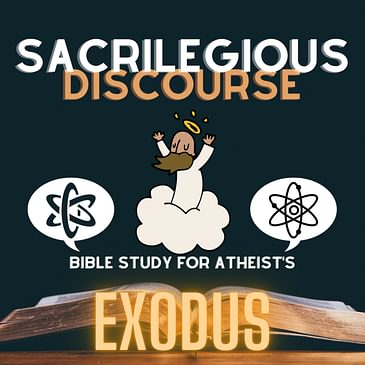Husband and Wife cover Exodus chapter 25:
Israel to Bring an Offering / The Arc of the Testimony / The Table for the Showbread / The Golden Candlestick; and chapter 26: The Tabernacle. Basically it's really bad Ikea instructions for building a giant fancy-pants jewelry box made all of gold which isn't gawdy IN ANY WAY WHATSOEVER. Also a sewing project if you can get to a Joann's in ancient times.
Join Acast+ to enjoy our podcast adfree! https://plus.acast.com/s/sacrilegiousiscourse.
- Exodus 25: God gives Moses detailed instructions on how to build a tabernacle, a portable sanctuary that the Israelites would use to worship him. The tabernacle was to be made of the finest materials, including gold, silver, and precious stones. It was to have three main parts: the outer court, the inner sanctuary, and the holy of holies.
- Exodus 26: The instructions for building the tabernacle continue. The outer court was to be enclosed by a curtain made of linen. The inner sanctuary was to be separated from the outer court by a veil made of blue, purple, and scarlet yarn. The holy of holies was to be the innermost part of the tabernacle. It was to be covered by a curtain made of gold.
From an atheist perspective, these chapters are simply a record of the Israelites' beliefs about how they should worship God. There is no evidence to suggest that God actually gave these instructions to Moses. The descriptions of the tabernacle are also highly unrealistic. The materials and craftsmanship described would have been very expensive and time-consuming to obtain. It is unlikely that the Israelites would have been able to build such a complex structure in the desert.
The chapters also raise some ethical questions. For example, why would God require the Israelites to use such expensive materials to build a tabernacle? Why would he require them to make such a complex and elaborate structure? It seems that God is more interested in the Israelites' obedience than he is in their worship.
Overall, Exodus chapters 25 and 26 are a fascinating glimpse into the Israelites' beliefs about worship. However, from an atheist perspective, they are simply a record of those beliefs, not a divine revelation.
In addition to the above, here are some other things to consider from an atheist perspective:
- The instructions for building the tabernacle are very specific. This suggests that they were written down after the fact, rather than being revealed to Moses by God.
- The tabernacle is described as being a copy of a heavenly sanctuary. This is a common theme in religious texts, but there is no evidence to support it.
- The tabernacle is said to have been a place where God would meet with the Israelites. However, there is no evidence that this actually happened.
Ultimately, the meaning of Exodus chapters 25 and 26 is up to the individual reader to decide. However, from an atheist perspective, they are simply a record of the Israelites' beliefs about worship.
Hosted on Acast. See acast.com/privacy for more information.






